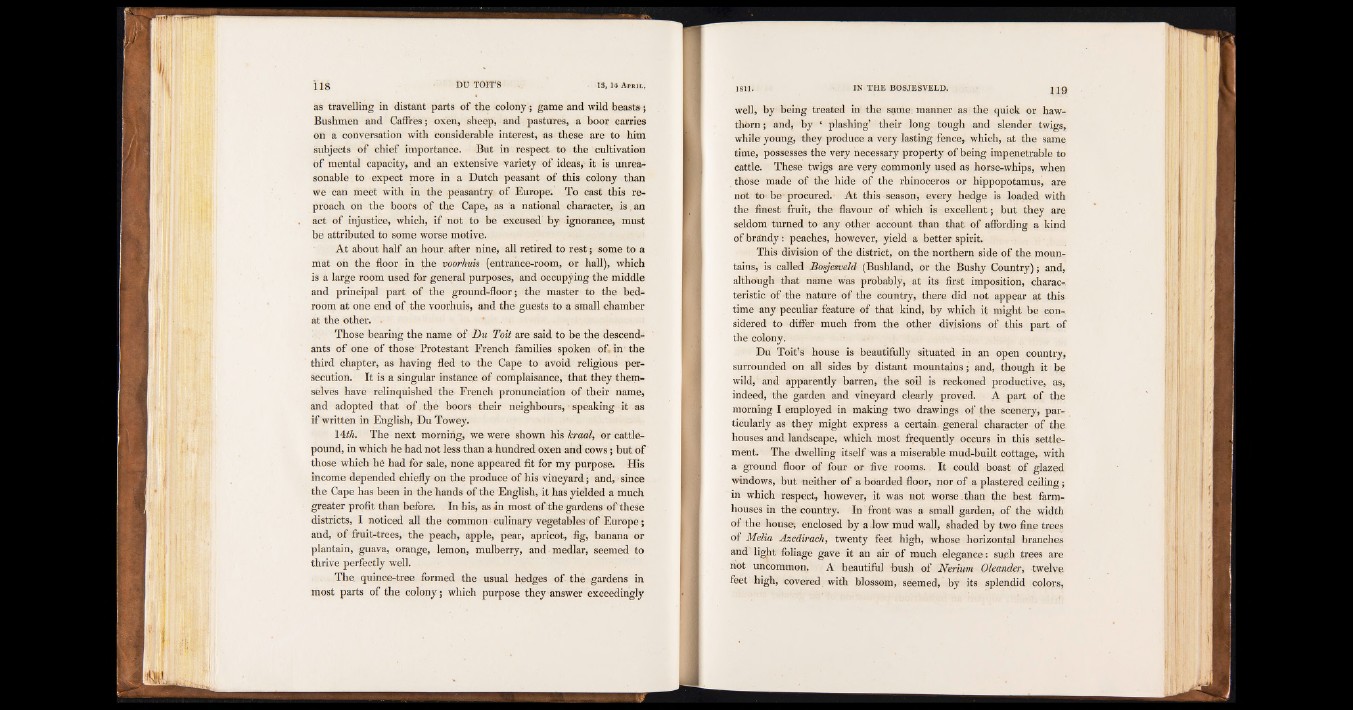
as travelling in distant parts of the colony; game and wild beasts ;
Bushmen and Caffres; oxen, sheep, and pastures, a boor carries
on a conversation with considerable interest, as these are to him
subjects of chief importance. But in respect to the cultivation
of mental capacity, and an extensive variety of ideas, it is unreasonable
to expect more in a Dutch peasant of this colony than
we can meet with in the peasantry of Europe. To cast this reproach
on the boors of the Cape, as a national character, is an
act of injustice, which, if not to be excused by ignorance, must
be attributed to some worse motive.
At about half an hour after nine, all retired to re st; some to a
mat on the floor in the voorhuis (entrance-room, or hall), which
is a large room used for general purposes, and occupying the middle
and principal part of the ground-floor; the master to the bedroom
at one end of the voorhuis, and the guests to a small chamber
at the other. .
Those bearing the name of Du Toil are said to be the descendants
of one of those Protestant French families spoken of. in the
third chapter, as having fled to the Cape to avoid religious persecution.
It is a singular instance of complaisance, that they themselves
have relinquished the French pronunciation of their name,
and adopted that of the boors their neighbours, speaking it as
if written in English, Du Towey.
14th. The next morning, we were shown his kraal, or cattle-
pound, in which he had not less than a hundred oxen and cows; but of
those which he had for sale, none appeared fit for my purpose. His
income depended chiefly on the produce of his vineyard; and, since
the Cape has been in the hands of the English, it has yielded a much
greater profit than before. In his, as in most of the gardens of these
districts, I noticed all the Common culinary vegetables of Europe;
and, of fruit-trees, the peach, apple, pear, apricot, fig, banana or
plantain, guava, orange, lemon, mulberry, and medlar, seemed to
thrive perfectly well.
The quince-tree formed the usual hedges o f the gardens in
most parts of the colony; which purpose they answer exceedingly
well, by being treated in the same manner as the quick or hawthorn
; and, by ‘ plashing’ their long tough and slender twigs,
while young, they produce a very lasting fence, which, at the same
time, possesses the very necessary property of being impenetrable to
cattle. These twigs are very commonly used as horse-whips, when
those made of the hide of the rhinoceros or hippopotamus, are
not to be procured.- At this season, every hedge is loaded with
the finest fruit, the flavour of which is excellent; but they are
seldom turned to any other account than that of affording a kind
of brandy: peaches, however, yield a better spirit.
This division of the district, on the northern side of the mountains,
is called Bosjesveld (Bushland, or the Bushy Country); and,
although that name was probably, at its first imposition, characteristic
of the nature of the country, there did not appear at this
time any peculiar feature of that kind, by which it might be considered
to differ much from the other divisions of this part of
the colony.
Du Toit’s house is beautifully situated in an open country,
surrounded on all sides by distant mountains; and, though it be
wild, and apparently barren, the soil is reckoned productive, as,
indeed, the garden and vineyard clearly proved. A part of the
morning I employed in making two drawings of the scenery, particularly
as they might express a certain, general character of the
houses and landscape, which most frequently occurs in this settlement.
The dwelling itself was a miserable mud-built cottage, with
a ground floor of four or five rooms. , It could boast of glazed
windows, but neither of a boarded floor, nor of a plastered ceiling;
in which respect, however, it was not worse .than the best farmhouses
in the country. In front was a small garden, of the width
of the house, enclosed by a.low mud wall, shaded by two fine trees
of Melia Azedirach, twenty feet high, whose horizontal branches
and light foliage gave it an air of much elegance; suph frees are
not uncommon. A beautiful -bush of Nerium Oleander, twelve
feet high, covered with blossom, seemed, by its splendid colors,